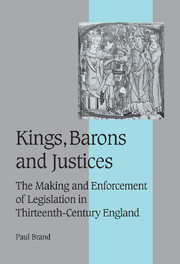Book contents
- Frontmatter
- Contents
- List of tables
- Preface
- List of abbreviations
- INTRODUCTION
- Part I Politics and the legislative reform of the common law: from the Provisions of Westminster of 1259 to the Statute of Marlborough of 1267
- Chapter 1 THE MAKING OF THE PROVISIONS OF WESTMINSTER: THE PROCESS OF DRAFTING AND THEIR POLITICAL CONTEXT
- Chapter 2 THE MAKING OF THE PROVISIONS OF WESTMINSTER: THE SOCIAL AND LEGAL CONTEXT AND THE EVOLUTION OF THE INDIVIDUAL CLAUSES: I
- Chapter 3 THE MAKING OF THE PROVISIONS OF WESTMINSTER: THE SOCIAL AND LEGAL CONTEXT AND THE EVOLUTION OF THE INDIVIDUAL CLAUSES: II
- Chapter 4 THE ENFORCEMENT OF THE PROVISIONS OF WESTMINSTER DURING THE INITIAL STAGE OF THEIR EXISTENCE, 1259–63
- Chapter 5 THE REVISION AND REISSUING OF THE PROVISIONS, 1263–4
- Chapter 6 THE REVISED PROVISIONS IN ACTION, 1263–7
- Chapter 7 THE FINAL REVISION AND REISSUE OF THE PROVISIONS OF WESTMINSTER: THE STATUTE OF MARLBOROUGH OF 1267
- Part II Beyond politics: the enforcement and interpretation of the Statute of Marlborough in the courts, 1267–1307
- Chapter 16 CONCLUSIONS
- Appendix I TEXT AND TRANSLATION OF THE PROVISIONS OF WESTMINSTER OF 1259
- Appendix II TEXT AND TRANSLATION OF THE PROVISIONS OF WESTMINSTER AS REISSUED IN 1263 AND 1264
- Appendix III TEXT AND TRANSLATION OF THE STATUTE OF MARLBOROUGH OF 1267
- Bibliography
- Index
- Cambridge Studies in Medieval Life and Thought Fourth series
Chapter 2 - THE MAKING OF THE PROVISIONS OF WESTMINSTER: THE SOCIAL AND LEGAL CONTEXT AND THE EVOLUTION OF THE INDIVIDUAL CLAUSES: I
Published online by Cambridge University Press: 16 June 2009
- Frontmatter
- Contents
- List of tables
- Preface
- List of abbreviations
- INTRODUCTION
- Part I Politics and the legislative reform of the common law: from the Provisions of Westminster of 1259 to the Statute of Marlborough of 1267
- Chapter 1 THE MAKING OF THE PROVISIONS OF WESTMINSTER: THE PROCESS OF DRAFTING AND THEIR POLITICAL CONTEXT
- Chapter 2 THE MAKING OF THE PROVISIONS OF WESTMINSTER: THE SOCIAL AND LEGAL CONTEXT AND THE EVOLUTION OF THE INDIVIDUAL CLAUSES: I
- Chapter 3 THE MAKING OF THE PROVISIONS OF WESTMINSTER: THE SOCIAL AND LEGAL CONTEXT AND THE EVOLUTION OF THE INDIVIDUAL CLAUSES: II
- Chapter 4 THE ENFORCEMENT OF THE PROVISIONS OF WESTMINSTER DURING THE INITIAL STAGE OF THEIR EXISTENCE, 1259–63
- Chapter 5 THE REVISION AND REISSUING OF THE PROVISIONS, 1263–4
- Chapter 6 THE REVISED PROVISIONS IN ACTION, 1263–7
- Chapter 7 THE FINAL REVISION AND REISSUE OF THE PROVISIONS OF WESTMINSTER: THE STATUTE OF MARLBOROUGH OF 1267
- Part II Beyond politics: the enforcement and interpretation of the Statute of Marlborough in the courts, 1267–1307
- Chapter 16 CONCLUSIONS
- Appendix I TEXT AND TRANSLATION OF THE PROVISIONS OF WESTMINSTER OF 1259
- Appendix II TEXT AND TRANSLATION OF THE PROVISIONS OF WESTMINSTER AS REISSUED IN 1263 AND 1264
- Appendix III TEXT AND TRANSLATION OF THE STATUTE OF MARLBOROUGH OF 1267
- Bibliography
- Index
- Cambridge Studies in Medieval Life and Thought Fourth series
Summary
The previous chapter located the Provisions of Westminster of 1259 within their immediate context, as one of the products of the ‘reform movement’ of 1258–9, and traced in general terms the stages by which the legislation developed from the first requests for legislation in the Petition of the Barons of the summer of 1258 through three separate drafts of part or all of the legislation to the final published text of October 1259. This chapter and the next locate the Provisions within a rather different broader contemporary setting by looking at the social and legal context of the individual clauses and the changes in the law which they were intended to produce. Only in this way is it possible to gauge the importance and significance of the changes which the Provisions were attempting to make. These two chapters will also trace the ways in which the proposals for legislation and individual clauses changed during the course of the drafting process, reflecting the care and effort that went into it. This chapter deals with those reforms which were concerned with different facets of the relationship between lords and their tenants and with the relationship between landowners and those who managed their lands, and those which made improvements in the procedures of the king's central courts.
- Type
- Chapter
- Information
- Kings, Barons and JusticesThe Making and Enforcement of Legislation in Thirteenth-Century England, pp. 42 - 76Publisher: Cambridge University PressPrint publication year: 2003



